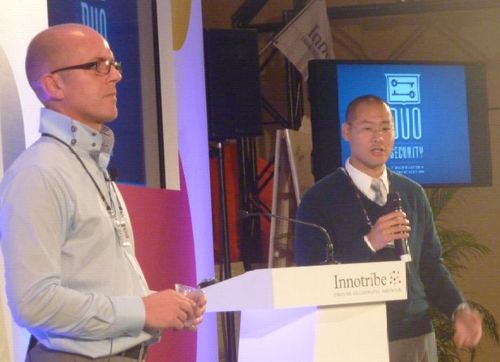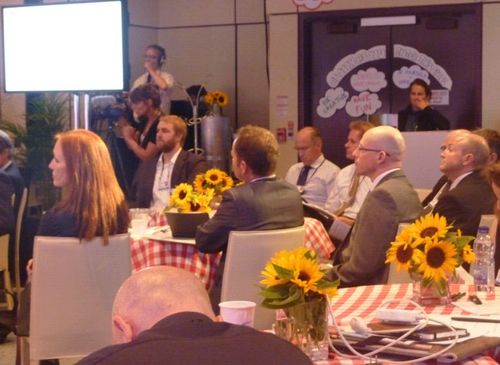
Just at the #innotribe startup challenge.
This is a competition for two prizes of $50,000 for companies that are startups in financial services related fields. Startup being defined as less than three years old with a demonstrable product.
200 firms applied, 78 were shortlisted and just 10 were selected for the final.
Two will get selected by the judges – which includes me, the innotribe team and a bunch of seasoned and senior bank people – to receive $50,000 each, funded by SWIFT.
Each firm got five minutes to pitch, and then Q&A.

The first presentation came from Celfony, a firm that claims they offer a Square style dongle for smartphones to enable Chip & PIN security into telephone based point of sale.
The second from ChangeIt who claim to be revolutionising the way that cardholders give to charities. It works by rounding up every transaction you make, once you are signed up, and will route payments to your favourite charities using the spare cents from each transaction. So you buy gas for $43.46 and 54 cents goes to your charity. You can set a limit each month and it just makes it easy.
It sounded similar to keep the change, which Bank of America rolled out, but the firm claims to hold the patent on change roundups for charities, rather than savings, which is what the BoA are offering.
The third firm up is Duo-Security, who offer security to avoid account takeovers by securing accounts on mobile devices using private keys in a SaaS delivered system. They claim their differentiation is that it is more comprehensive than most, by securing all phones, not just smartphones such as blackberries and androids. Interestingly, they already offer this via the PCI QSAs and are working with new currencies such as Bitcoin.
Fourth is Facecash, a system that uses your face on a mobile to authenticate transactions. Once registered, you preload the account with funds and optionally link it to your bank account. This then enables you to get coupons, offer P2P payments and receipts that include amounts, line items, place and geolocation for each transaction. You can even split bills easily too.
Merchants have a web-based browser option to take receipts using facecash and when they are taking the payment, guess what? They see the user’s picture of their face to authenticate the payment. Nice.
It’s also cheap, with a 1.5% flat fee which is cheaper than usual interchange fees, and the team includes people from PayPal and Sun.
For the user, it gives complete analysis of expenditures without having to do any accounting analysis, so expense reporting is easy and, if you want to know if this is worthwhile, there’s even a Chinese clone out there already so there must be something in it.
The fifth firm is Guardtime with an interesting emergence from Estonia, where a cyberattack from both domestic and overseas sources inspired their creation as new security firm.
The issue they are addressing is that data is not trusted, so they created a unique digital fingerprint that attaches to the data - a hash, date, time and origin of the data – to create a keyless signature that stays with the data throughout its lifetime.
In other words, whenever you want to validate any historical data, you can see its origin. They believe this is better for data validation than PKIs, as it is not managing identity but data validity.

Miicard got the sixth slot, and talked about how their product replaces Photo ID with a card for offline identity checks and KYC in real-time, online.
Their unique offer is claimed to be that you no longer need full documentation identity checks for complex product sales online, such as mortgages, as miicard gives you all that’s needed. Miicard has completed the KYC and AML beforehand, so it proves you are who you say you are.
They are partnering with Yodlee and one of the leading credit rating agencies, and have a patent pending.
SynerScope came next, with the idea of providing visualisation tools to transactions so that you can do pattern checking and real time monitoring. There’s no algorithms or anything, but Synerscope uses a proprietary converter to create pattern analysis across Big Data.
TransferWise are the eighth contestant, and they’ve created a social foreign exchange to avoid the high fees banks apply to cross-border currency transfers between accounts. It’s basically a peer-to-peer currency service where you find someone who has pounds sterling who need euros and marry them with someone who needs pounds sterling and has euros. They then transact to each other through TransferWise and avoid bank fees.
They got a big laugh when they said “we’ve already saved our customers over $200,000 in bank fees, sorry”, and I smiled a little when their first slide said “the ripoff 5%” which is what they claimed banks charged to take euro currencies to a sterling account and vice versa.
The firm was launched this year, are regulated by the FSA in the UK, and have already transferred almost $5 million peer-to-peer.
Truaxis are the penultimate performer. Interesting to find that Truaxis were formerly BillShrink, who won the Best in Show Award at Finovate Fall 2010, which I also attended and, by coincidence, is also taking place this week in New York as we sit in Toronto.
The difference between innotribe's startup challenge and finovate is that I guess the former is for the banks to be exposed to innovative startups, the latter is for investors and the tech community.
Anyways, back to Billshrink, sorry, Truaxis.
They’ve rebranded to widen the appeal from just bills being shrunk to acting as true axis for finance, coupons, offers and aggregation.
The firm has Yodlee’s CEO and CFO, and acts as a Personal Financial Management (PFM) system that uses wiki intelligence to analyse your credit card statement and show offers from businesses that may be able to offer you better services, e.g. if you paid off your BT telephone bill with your credit card, you might get a statement: “BT tell us that you just paid a quarterly bill and could have saved £25” next to the item when you view the billing online to promote special offers.
The final presentation came from Wave Accounting, a one-stop aggregated, unified financial solution for small businesses of nine employees or less. It allows the business owner to manage both their personal and business finances through Wave Accounting, as well as payroll. It is 100% free all the time to small businesses, which allows the firm to scale.
For example.,, they already have 60,000 customers after launching earlier this year and, based upon current growth expectations, believe they’ll achieve 850,000 by the end of next year.
It’s a good offer for banks, as it would allow banks to offer this to their small business users for free.
At the end of each presentation, the contestants got a good grilling from the judges …

… and were then assessed on the basis of how innovative the firms appear to be, the potential impact of their solution, and whether they have a compelling vision and team.
This was based upon formal feedback from all judges, with the results assimilated and accounted at tomorrow’s plenary session.
Can’t wait for that and you can find the full entries for each of these firms to innotribe at my blog entry of last week .
My vote went to Facecash btw, closely followed by TransferWise.
Anyways, that’s the end of SIBOS Day Three and it’s time SIBOS Night Three … liver bashing continues in earnest lol …
Chris M Skinner
Chris Skinner is best known as an independent commentator on the financial markets through his blog, TheFinanser.com, as author of the bestselling book Digital Bank, and Chair of the European networking forum the Financial Services Club. He has been voted one of the most influential people in banking by The Financial Brand (as well as one of the best blogs), a FinTech Titan (Next Bank), one of the Fintech Leaders you need to follow (City AM, Deluxe and Jax Finance), as well as one of the Top 40 most influential people in financial technology by the Wall Street Journal's Financial News. To learn more click here...




















